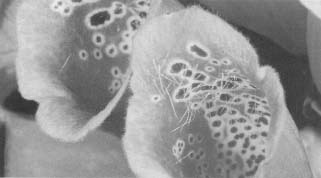Digitalis
Doctors often treat illnesses with drugs derived (obtained) from special substances found in plants. One of the most important of these drugs is digitalis, which is used to treat congestive heart failure. This heart condition occurs when the heart becomes enlarged and loses some of its effectiveness in pumping blood. Swelling caused by an accumulation of fluid in the arms and legs or hands and feet may be a sign of congestive heart failure. As long ago as the thirteenth century, people who used "folk" remedies began to notice that a plant commonly known as foxglove produced a medicine that could be used to treat some types of this swelling, called "dropsy." The medical term for swelling caused by a buildup of fluid is edema. Digitalis is one of the most useful drugs in treating heart disease. It works by making the heart's contractions stronger without causing it to beat faster and become overworked. This results in a slower, more effective heartbeat with longer periods of rest for the heart in between.

Foxglove
Common foxglove is grown in gardens as a popular flower and also grows wild along roadsides and in meadows or logged areas, mainly in the western United States. The botanical name for common foxglove is Digitalis purpurea. Foxglove was brought to the United States by European migrants centuries ago. The plant has tube-shaped, spotted, purple flowers and grows to about five feet tall, with many large, thick, hairy leaves at the base of a tall stem. The variety grown in gardens varies in color from white to a deep rose.
Digitalis is one of the most well known medicines derived from a plant. Today scientists are searching in jungles and tropical rain forests for other plants that may contain substances to cure cancer, hepatitis, AIDS, and other serious diseases. Native medicine healers have used plants to treat illnesses among their people for thousands of years, and scientists today are working with modern-day medicine men in hopes of finding new wonder drugs among the earth's fast-disappearing natural resources.
The Pharmacy in the Garden
Other drugs used today that come from plants include tubocurarine, a surgical anesthetic derived from the curare vine; ephedrine, the active ingredient in decongestants, found in the stem of a Chinese shrub called mahuang; the opium poppy, which contains more than 20 alkaloids, of which morphine, codeine, and heroin are the most well known; aspirin, a painkiller derived from willow tree bark; reserpine, an anti-hypertensive that comes from the snakeroot plant; atropine, an intestinal (smooth muscle) antispasmodic and pupil dilator found in belladonna (deadly nightshade); and physostigmine, a glaucoma treatment and atropine poisoning antidote (remedy) derived from the Calabar bean.
Withering's Studies
In 1775 an English doctor named William Withering (1741-1799) began studying the foxglove plant. He learned that an effective medicine for treating heart ailments could be made from drying leaves picked just before the plant blossomed and crushing them into a powder. Withering also discovered that this medicine, digitalis—one of a number of substances called found in the plant—could be poisonous if the patient was given too much. Withering was aware that digitalis was effective only in certain forms of dropsy (edema), but apparently did not associate this with the cardiac actions of the drug. Withering published his findings about digitalis in 1785, but in spite of his warnings about proper dosage, many doctors prescribed the medicine in doses that were too large and for sicknesses it could not cure.
The active principles of digitalis were not known to researchers until the mid-1800s, when two French scientists, Homolle Ouevenne and Theodore Ouevenne, found the substance digitalin in the foxglove plant. In 1875 Oscar Schmiedeberg (1838-1921) identified the potent chemical digitoxin in the plant, and in 1930 the English chemist Sydney Smith obtained the medicine used today, digoxin, from the wooly foxglove plant, Digitalis lanata.
Today doctors know that if too much digitalis enters the circulatory system the patient may experience nausea, vomiting, trouble with vision (seeing too much yellow or green), and a very slow and irregular heartbeat. A larger amount of digitalis can result in convulsions (severe seizures) and death. Even grazing animals that eat too much of the foxglove plant can become poisoned by its glycosides.
Thx signed stuck4hmwk
Pls thanks i lk that uve tried